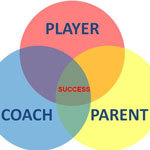“Some parents would rather have their son get all-state than his team win the state championship” – Don Meyer
 Most parents—indeed, all parents—want their children to succeed in youth sports. Parents would like their children to be stars. That’s normal. And they want to be involved in their child’s—sport activities. That, too, is normal. In fact, parental involvement is a critical element in today’s fast-pace, result-oriented game of basketball. It is no easy task to be a parent of a young athlete. It can be an overwhelming task sometimes, but it must be handled in a positive way.
Most parents—indeed, all parents—want their children to succeed in youth sports. Parents would like their children to be stars. That’s normal. And they want to be involved in their child’s—sport activities. That, too, is normal. In fact, parental involvement is a critical element in today’s fast-pace, result-oriented game of basketball. It is no easy task to be a parent of a young athlete. It can be an overwhelming task sometimes, but it must be handled in a positive way.
Young athletes today are wiser, smarter, and more informed than their previous generations. The pressure on young athletes today, to come through with winning performances, is much greater than previous generations.
Between their coaches, teammates and the pressure to uphold their ego and self-identification as an athlete in their sport, that’s all they need to learn to prepare for the competitive adult world. Parents need to do everything they can to avoid adding more stress and pressure to their athletic kids.
Young athletes subconsciously pick up on signals more than you might guess. They can easily feel like they’re letting their parents down. Parents of young athletes must recognize that their No. 1 job is to support their kids by making sure that they clearly receive communication and that their approval of their child is not dependent on how he or she performs in a basketball game.
The irony of this whole thing is that when parents put this kind of pressure on their kids, it actually is more likely to hurt their basketball mental toughness and performance. If you ask any sports psychologist for basketball, what is the No. 1 issue holding young athletes back, you will get an answer similar to this: “Performance anxiety.”
Young athletes play their best when they play for the love of their sport and their own internal desire to challenge and improve themselves. Parents can help out by consistently praising their young athlete. Leave the coaching to the coaches.
Sports psychologists believe there are more stressors now than ever before. Temperament and experiences of each young athlete will determine how they perceive the world.
If there is an imbalance between the demand and their confidence in accomplishing the task, the individual will experience a stress response. The athlete will become aroused, display increased worry, have increased muscle tension, and likely have difficulty concentrating. As a result, the athlete may perform poorly rather than achieve the desired outcome. This process can become a vicious cycle if the athlete continues to feel threatened and is not able to meet the demand successfully.
In order for an athlete to perform at his or her optimal level and get the most enjoyment out of sports there are warning signs that adults need to be cognizant of.
Coaches and parents serve as educators in teaching skills like responsibility, discipline, or a new skill in developing their mental game in basketball. The same applies to handling stressful situations and emotional regulation.
Coaches who work with youth should know each child on an individual level and have an idea of their baseline performance. Any change in behavior or performance should be noted immediately. Signs to watch for if an athlete is experiences increased stress or anxiety include frequent urination, muscle tension, sweating, irritability, somatic complaints (headache and stomachache), negative self-talk, trouble concentrating, and difficulty sleeping.
Youth sports burnout is also increasing at an alarming rate, and millions of kids are becoming both mentally and physically fatigued from playing basketball too intensely, often year-round.
Sadly, this phenomenon seems to be getting worse, and not better.
“The more parents can educate themselves to have a realistic idea of what they’re trying to accomplish when they put their kid in youth sports – and the more we can help them be more realistic about things like college athletic scholarships — the better it will be for the kids, and the more fun they’ll have,” says Fred Bowen, a renowned basketball psychologist.
When it comes to kids and sports what’s most important to remember is — the health and enjoyment that sports give your kids. Keep this as your priority, and you’ll avoid creating an unhealthy focus on one sport or causing your kids to be more susceptible to sports related injuries.
*Download the free mental game assessment and get started on Improving your Mental Game in Basketball

Females athletes now realize what they’re capable of. And they should follow it in order to attain an effective result and benefit to their sport or athletic performance.